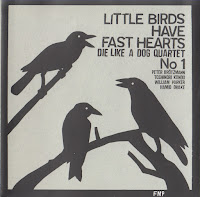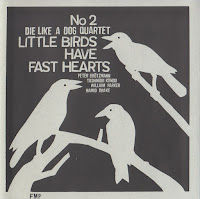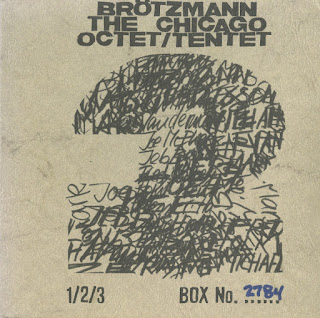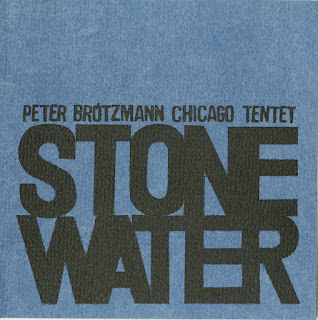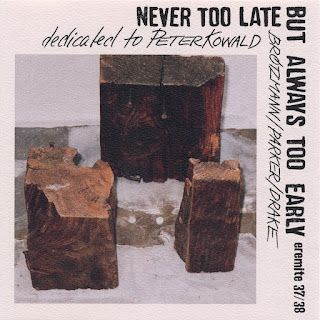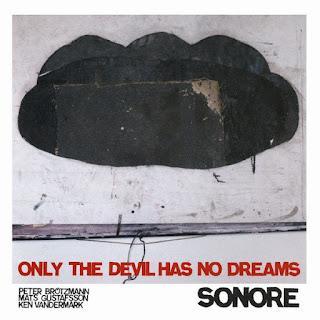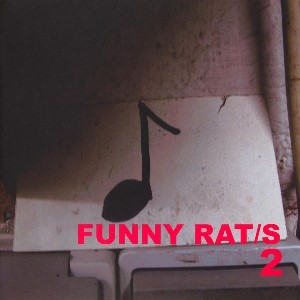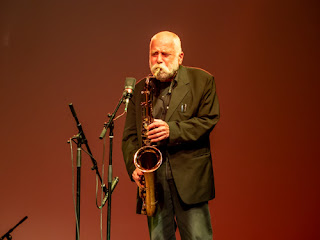 |
| Peter Brötzmann. Photo by Peter Gannushkin |
Day two of our tribute to saxophonist Peter Brötzmann. See day one here.
Peter Brötzmann, Toshinori Kondo, William Parker, Hamid Drake — Little Birds
Have Fast Hearts, No. 1 & No. 2 (FMP, 1998 & 1999)
These two albums, divided into six parts, were taken from performances by the
Die Like a Dog quartet over 7, 8, and 9 November 1997 during the 30th Total Music Meeting at the Theater im Podewil in Berlin.
Just four years after the quartet’s debut it’s clear that things had moved on.
There remains the combustible electro-acoustic mix of processed trumpet and
reeds – at their peaks like a couple of dogs howling at the moon – swirling
about the rooted, earthy patterns of Parker and Drake whose mesmeric pulse is
shot through with African rhythms, providing not just momentum but the weave
that binds the quartet together.
Yet there’s also greater diversity, time given to open out Kondo’s ricocheting
lines and appreciate their melodic invention and grace: delicate, air-blown,
ephemeral. Brötzmann’s dense accumulations contrast with his exploitation of
nuances in tone and more song-like tendencies that were to come to the fore in
later years. There’s genuine subtlety in the way he and Kondo linger over
phrases in quieter passages, like calls and echoes across water, framed by the
tracery of bass and drums.
Such are the variations in temper and intensity across the mammoth 45 minute
‘Part 1”, and the perfectly calibrated ensembles of ‘Part 2’, that they feel
akin to tragic dramas – ancient stories are being told, furious and lyrical,
which still resonate down the ages. All this is assisted by a vivid recording
capturing the timbral tang of liquified trumpet set against scabrous blasts on
tenor, sculpted bass figurations, and the flickering light of Drake’s
percussion.
The second CD ranges over similar terrain, sinewy and savage. ‘Part 5” has the
tread of a sombre procession, full of wails and lamentations, and the
concluding ‘Part 6’ is an incandescent conflagration; after which there is
nowhere left to go.
The later Hairy Bones quartet, with Massimo Pupillo and Paal Nilssen-Love
replacing Parker and Drake, had a different though equally valid dynamic, but
for music that seemed to unite so many strands – old and new, Western and
non-Western – these discs are a testament to one of the most exhilarating (and
emotionally draining) groups in the history of jazz, at the height of its
powers.
Peter Brötzmann -The Chicago Octet/Tentet (Okka Disc, 1998)
A crucial release that broke ground for a major phase of Brötzmann’s music,
the Chicago Tentet. The lineup is mind-blowing, and the music completely
knocked me sideways the first time I heard it. With compositions by
Brötzmann, Gustafsson, Vandermark, Bishop, Lonberg-Holm, Drake, and
Zerang, the range of Brötzmann’s vision has, arguably, rarely reached the
highs of this set. Considering the huge number of albums he recorded and
contributed to, that feels like a bold statement, but, I’ll defend it forever.
The Chicago Octet/Tentet box broke several molds, including one that
seemingly held Brötzmann himself.
The Peter Brötzmann Chicago Tentet – Stone/Water (Okka Disc, 2000)
If pressed to recommend a single Chicago Tentet album this is the one I would
choose. It may not be their best release but it’s definitely among them – and
it’s also pretty concise, comparatively. There is so much action in the
album’s 40 minutes that it’s like getting 10 lbs of skronk in a 5 lb sack –
it’s bursting at the seams with inventiveness, contrast, and power. And again,
what a lineup. Joining our hero on reeds are Ken Vandermark and Mats
Gustafsson, with Jeb Bishop on trombone, Fred Lonberg-Holm on cello and
violin, William Parker and Kent Kessler on bass, Michael Zerang and Hamid
Drake on drums, and the great Toshinori Kondo on trumpet and electronics. Wild
group chorus howls, growling free blown frenzies, and other collective
insanities are interspersed among the racing, grunting strings. Stark peels of
electric trumpet reverberate in silences so sudden they are as jarring as the
blowouts. Tremendous emissions that flow from peak to valley and back again,
as hinted at in the album title. Kondo is given plenty of room to stretch out
and do his thing. Swirling electronic interference shrouds his candid
lamentations, the reeds barking and nipping at his heels, lashing and
flickering like flame. Things coalesce occasionally, and there is a segment
where a steady/slight rhythm develops, which prompts a terrific set of solos
from the horns. But this is short lived, and the floodgates cannot be held
back for long. The Tentet is one of Brötzmann’s most important groups,
the makeup and technical proficiency of the ensemble and the fire with which
they played is not likely to be matched. Incredible music.
Peter Brötzmann, William Parker, Hamid Drake – Never Too Late But Always Too Early (Eremite, 2003) (originally published Coda, 2003)
Homages to the late Peter Kowald grow more numerous, but few will match the searing, visceral pull of this two CD set etched by some of his closest friends & associates in Montreal’s Casa Del Popolo in 2001 & dedicated to Kowald after his death in 2002. Peter Brötzmann is a specter of grim emotion & raw energy, whether he’s playing tarogato, tenor, or a clarinet in A. He is one of the great existential improvisers of free jazz, in that his intensity does not seem to move toward transcendence but instead speaks of expanding passion. It is because of Brötzmann’s emotional register that this epitaph in advance to Kowald is so fitting. Pain, loss, distance seem so central to the saxophonist’s expression –witness the tenor dirge of part 4 of “Never Run, But Go” which seems to refer directly to ‘taps’– that the specific subject only awaits naming. William Parker & Hamid Drake support, structure & alleviate Brötzmann’s testimony, adding & sustaining pulsing patterns that invoke African & Afro-Cuban ceremony. On the first segment of the title piece Brötzmann launches a bass clarinet solo in which human cries are seemingly muffled in the instrument’s woolly depths until they break out into screams in the middle register. Parker & Drake seem to ground & share in this witnessing, until Parker begins an extended & especially powerful bowed solo.
Sonore – Only the Devil has No Dreams (Jazzwerkstatt, 2007)
Sonore’s Only the Devil Has No Dreams was captured at the Philharmonie in
Berlin on September 27, 2006 for Jazzwerkstatt’s inaugural concert. The trio of
uncompromising woodwindists, Peter Brötzmann, Ken Vandermark and Mats
Gustafsson, produce music that is equal measure brutal and tender, and on this
date, they perform it all. From the opening moments of the recording the intent
is clear: Brötzmann’s penetrating call and the persistent rhythm of a baritone
sax lay the groundwork for an explosive start. Later, more lyrical lines
intertwine, like on “First Feedback” and “Two Birds in a Feather” (which quietly
flows, moans, and meanders). The final title track builds from the tender to the
brutal and back in a patient, telepathic way.
Funny Rat/s 2 Peter Brötzmann & Shoji Hano (Kootown Records, 2008)
Over the years Peter Brötzmann made regular trips to Japan, though many of his
collaborations with Japanese musicians were actually recorded in Europe. We do
have however, three duo albums with drummer Shoji Hano made during Brötzmann’s
visits, of which this is the second recorded in 2007 at Candy, Chiba in the
intimate acoustic of a small club.
Saxophone and drums are a staple format in free jazz and there are many fine
examples in Brötzmann’s discography. This one stands out as an especially
empathetic meeting, perhaps reflecting the strong lineage the combination has
in Japan. There’s an incision and a precision to Hano’s playing, with an
emphasis on cross-rhythms and pacing rather than metre. Hano is pulled into
Brötzmann’s creative orbit, matching his different moods and emotional
temperatures, from full-throttle agglomerations to simple, tender ballads. ‘A
Jiggle Snaps the Lock’, ‘An Essential Dream’, and ‘Special Delivery’, with
Brötzmann on gnarled tárogató, tenor, and ear-scouring alto respectively,
display the epic sweep and extremes of dark and light that typified so much of
his mature work, what he once referred to as the love and desperation he found
in Ayler’s music.
Not all the exchanges take place in a tumescent fever. ‘Frog Fuck’ features
the emberous glow of Brötzmann’s clarinet as it moves through pools of
introspection, punctuated by occasional squalls and balanced by Hano’s
whispered counterpoint with brushes.
All three of the duo’s recordings are strongly recommended. Here they are
going hell-for-leather at the same venue the following year:
– Colin Green

